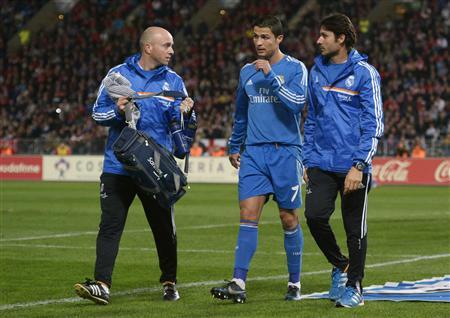Sports
Premier League Badly Needs Superstars Like Ronaldo

By Jim White –
It is not something we generally expect from a man whose public utterances on the subject of football can generally be classified as Blatter. But Florentino Perez, the president of Real Madrid, said something really interesting as his player Cristiano Ronaldo was acknowledged as the world’s best at the Ballon d’Or ceremony this week.
“As I have always said about big signings,” said Signor Perez. “The most expensive players are in fact the cheapest.”
He has a point there: in terms of value for money, there is no doubt that Ronaldo has delivered. £80 million it cost to prise the player from Sir Alex Ferguson’s clutches back in the summer of 2009. And since then, all he has done is to prove wonderful value for his new employers. Astonishing numbers of goals, incredibly lucrative commercial tie-ins, an aura of certainty: he has brought all that and more.
As the entire Ballon d’or business demonstrates, it is an odd thing about a team sport how keen we are to view football as a one-man game. But however ridiculous a notion it may seem, in many respects Ronaldo has been carrying Madrid for the past four years.
In the new markets of the Far East in particular, he powers their commercial engine: in Singapore and Seoul many of those who fork out for new white home shirts and subscribe to new Madrid phone apps do so because of him. Over there they follow the man not the club. Madrid are fortunate they boast in their ranks the man to follow. Or maybe, Perez insists, they are not fortunate. Rather they are astute.
Ronaldo is without question the exemplar of the modern way of judging football success. Madrid may not have won anything beyond one La Liga title and one Cope del Rey during his five years at the Bernabeu. But they have hugely benefitted financially; thanks to his gilded goals and photogenic presence they are now the biggest brand in world football.
What Perez was hinting at was that in the modern game, the individual counts. And if a club wants to benefit from the cult of the personality, it has to speculate to accumulate. That has always been his policy.
This is, after all, the man who invented the idea of the galactico. This is the man who persuaded David Beckham to institute divorce proceedings with his first love and decamp to the white side. This is the man, too, who cheerfully broke his own world record to bring in Gareth Bale last summer, a signing who, while lacking Ronaldo’s preening narcissism, is beginning in his performances to suggest he may too repay the outlay.
English clubs, meanwhile, have been slow to keep pace with what Perez sees as the way forward. There was not a single English-based player in the FIFA Team of the Year. It is hard to argue that there should be.
Sure, you could select a pretty handy current best of the Premier League XI (try: Cech; Zabaleta, Kompany, Koscielny, Baines; Silva, Ramsey, Toure, Hazard; Suarez, Negredo). But compare it to the official FIFA team (Neuer; Alves, Thiago Silva, Ramos, Lahm; Xavi, Iniesta, Ribery; Ronaldo, Ibrahimovic, Messi) and you can only acknowledge it comes a poor second. Not just in performance capability, either. But in stardust. The biggest names in world football are simply not plying their trade in England.
Why? Because, even though the Premier League is awash with money from the most lucrative television deal in world sport, there has been a reluctance among the owners of our top teams to embrace the Perez methodology.
Take Manchester United. They forked out £30m, then a world record sum for a defender, to sign Rio Ferdinand in 2003. In the ensuing decade they have yet to surpass that, spending roughly the same amount but twice – on Wayne Rooney and Dimitar Berbatov.
While Madrid, Barcelona and PSG are prepared regularly to invest more than twice as much as that in a proper star signing, United pay £28million for Marouanne Fellaini, a player currently summing up the flip side of Perez’s argument: that sometimes cheap buys turn out to be very expensive indeed.
Sure, United’s market reticence has largely been driven by the crippling consequences of unnecessary debt foisted on their finances by their absentee landlords. Arsenal too have been held back largely by their manager’s moral distaste for the hefty purchase. But even City and Chelsea, the two clubs without apparent restriction on their outlay, have failed to keep pace with the rising cost of the very best.
Ultimately whether the Perez method is the right one will be made clear when the Champions League returns in March. But until we have proof otherwise on the pitch, you have to wonder whether the Premier League’s reluctance to hand over the really big cash will come back to haunt it.
Article originally published on Eurosport







